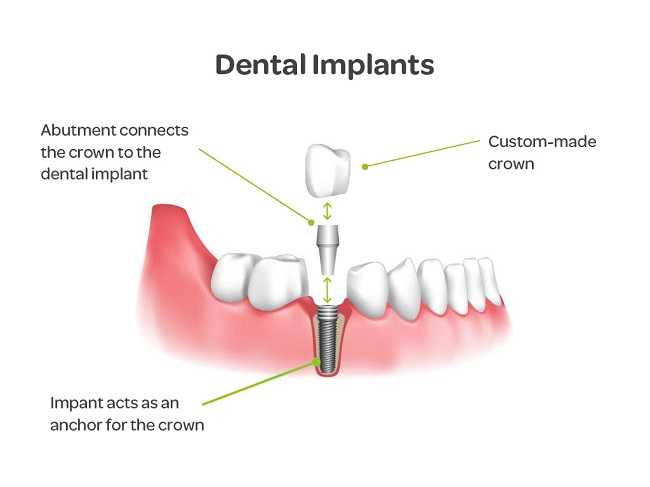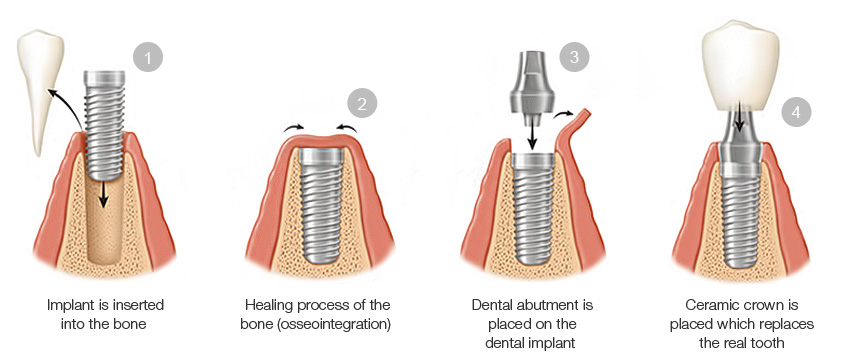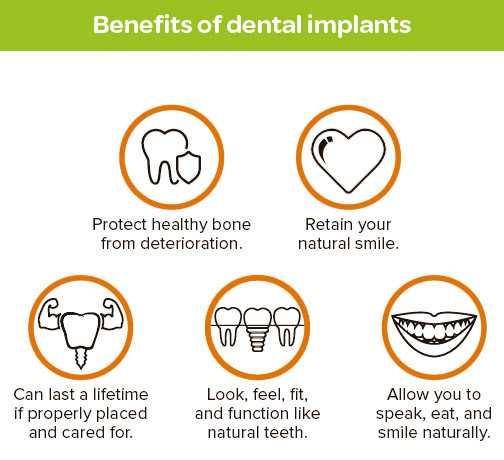Dental Implants
Dental Implants are one of the solutions for missing teeth. The crowns, bridges, or dentures can be supported with the help of dental implants easily. The screw is fixed in the jawbone with the surgical fixture in an easier way. To make it function properly, the screw is generally placed on it.

Talk to a Dentist Now!
Table of content
- What are Dental Implants?
- How does a dental implant/tooth implant work?
- What are the steps of dental implant/tooth implant treatment?
- Benefits of Implants Over Other Options
- How Safe are Dental Implants?
- Are There Different Types of Implants?
- What is the cost of Dental Implants?
- Are dental implants painful?
- Are dental implants affordable?
- Can everyone get a dental implant?
- Do dental implants feel natural?
- What are the effects of dental implants?
- Faq’s
What are dental Implant?
There is nothing that is as good as your natural tooth. However, people can lose their teeth due to many reasons – decay, trauma, gum disease, bone disease, etc. In order to eat, chew and talk, we need our teeth. So, to restore a person’s missing tooth, dentistry provides a few options – dentures, crown and bridge and implants!How does a dental implant/tooth implant work?

This process of blending between the dental implant and jawbone is called “osseointegration.” Implants are made up of titanium, an element that is biocompatible and routinely used in surgeries to replace bones.
The dental implant actually replaces the root of a missing tooth. On top of this screw-like structure, an implant crown or a bridge is placed. Having a dental implant fused to the jawbone is the closest thing to resemble a natural tooth because it stands on its own without affecting the nearby teeth and has great stability. As compared to a bridge to replace missing tooth/teeth, an implant doesn’t disturb adjacent teeth and has superior aesthetics too. With advances in dentistry in the recent past, there have been many advances even in the field of implants, which have significantly improved the success rate of implants clinically.What are the steps of dental implant/tooth implant treatment?

- Diagnosis and treatment planning
- Placement of implant
- Healing phase
- Prosthetic phase
Benefits of Implants Over Other Options
Many patients are sceptical about implant placement as they are relatively newer than the dentures and crowns that have been around for some time. Also, implants are slightly more expensive than dentures and bridges and so people prefer to choose them over implants.
- Compared to dentures, implants are fixed options which means they provide more comfort and stability
- Since dentures cover a large part of our gum tissue, taste and temperature sensation are nearly lost while one eats their food. This, however, is not seen with implants
- Compared to bridges, implant treatment takes a longer time to complete. However, in the case of bridges, adjacent teeth are prepared to support the missing tooth and can sometimes be slightly compromised in their strength and structure. Implants, on the other hand, are standalone structures and do not cause harm to nearby teeth
- They have the most superior aesthetics and look very similar to natural teeth
- When done properly, implants can last a lifetime, unlike dentures and crowns and bridges, which need to be replaced after a couple of years
How Safe are Dental Implants?
After understanding the procedure involved in the placement of implant and implant crown, one question that may have cropped up in your mind is How safe are dental implants? Well, dental implants are absolutely safe and are routinely done in clinical practise to help replace a person’s missing tooth/teeth. Since the implant is made up of a biocompatible element titanium, it is safe to use inside the body. Infact, titanium screws and plates are routinely used in surgery of bones and joints. The surgical procedure that is done to place the implant screw is similar to the procedure used to extract teeth. Both are performed under local anaesthesia in the dental clinic.Are there Different Types of Implants?
Yes, there are different types of dental implants and the right implant for you is chosen by your dentist/implantologist based on the location of the missing tooth, the thickness and height of the jaw bone in that area, health of the patient, and the amount that the patient is willing to spend. In most cases, your dentist will inform you which is the best implant type for you. Feel free to discuss the same with your dentist. If you wish to replace a missing tooth or teeth and want some more information about dental implants, visit your nearest Sabka Dentist clinic. Our dental team and implantologist are well-equipped to give you a painless implant treatment and restore the smile and function of your teeth!What is the Dental Implants Cost in India?
One of the biggest myths about dental implants is that they are expensive. However, the truth is dental implants are affordable options to replace missing teeth. Comparing their cost to resin-based dentures, implants may seem costly but comparing the benefits and advantages of implants with those of removable dentures, the implants are worth the cost. Many a time, the cost of a bridge unit is the same or more expensive than the cost of 2-3 implants that can be placed in its place. The cost of implants also depends upon the type of implant, the technique involved, surgical costs, bone grafts that may be needed in some cases, and the brand of implant one chooses. At our Sabka Dentist clinics, we offer attractive payment schemes for implant treatments that make it easier for you to pay for your implant treatment. Contact our dental team for more information.Are dental implants painful?
When you are going for dental treatment like dental implants then it is obvious that you may doubt the intensity of pain in the dental implants. The dental implants are done when tooth loss occurs and it is a little painful, still, it is bearable. When you get your dental implants, it is a little discomfort initially because your mouth is not used to it. A mild soreness also occurs in the mouth which may affect the taste while eating food during the initial days, so taking proper care is essential. In fact, during the process of the dental implant, anesthesia is given which will minimize the pain during the treatment process. Taking pain medications as suggested can help to relieve the pain.Are dental implants affordable?
Dental implants are one of the solutions to the missing tooth or teeth. It will have some cost as a titanium post is put in the gum line beneath the jawbone in the tooth root. The cost will with respect to the material used. Also, inserting this material would involve surgical process and giving a look of the natural tooth and implantologist will be attached. The cost will depend on the material used for the tooth implant, the cost of the specialist, and considering any other complexities. In the case of full mouth dental implants, the cost will increase, yet you might get some concession in cost per tooth implant. Overall, the cost will be much affordable compared to the value given.Can everyone get a dental implant?
For treatment like a dental implant, everyone is a candidate. Many of the techniques are available to deal with tooth loss. For ensuring proper care after the dental implants, few things are considered concerning the dental implant. Following cases are considered:- If the patient is a child then most of the experts recommend waiting till the age of 18 years
- In case of severe health issues like diabetes, weakness, and a few other things, the experts have to do proper pain medications
- Improper bone can also be problematic in the dental implants as it cannot be supportive, still, in some cases, alternative methods can be used.
Do dental implants feel natural?
Mostly many of the patients will not feel the exact effect as that of the natural teeth, still, the things are much better than no tooth at all. Most of the patients feel very uncomfortable while eating the food during the initial few weeks and they feel comfortable after some period. Some patients feel a little sensation during the few days. If it is a single tooth then you may not feel more uncomfortable, however, in the case of more than two teeth, it will be a little discomfort. Over a certain period, you will get accustomed to it and do daily activities properly. For people who do full mouth dental implants, it is very uncomfortable for the first three weeks. However, after a period of one or two months, you will start feeling the dental implant is more natural.What are the effects of dental implants?
It is difficult to chew food and smile when you have a missing tooth. Dental implants appear as artificial tooth that gives an aesthetic appearance to the teeth. As zirconia dental implants cost in India is comparatively lower, many people prefer this type of treatment. Any dental implants can make it easier for chewing food, prevent the neighbouring teeth from replacing the position, and dental implants also improve the aesthetic appearance of the smile. If you are looking for the best dental implants near you for your missing teeth. Then Sabka dentist is a better choice for you. They have expertise in giving quality dental implant treatment. Sabka dentist has lower dental implants cost in India that can be easy to afford. They have branches in prime locations of some important cities of India. Visit Sabka dentist clinic to get an excellent dental implant solution.Expert's Opinion
- Dr. Reena Waghela Dental Director of Sabka dentist says “Tooth implant not only fills the gap but also help to restore the normal function of the tooth. Most of our patients are happy with the implant because it feels almost like a natural tooth”.
- Dr. Ankita Gada BDS, Dental Director at Sabka dentist says “Implant is the good option if you have missing tooth or teeth”.
- Dr. Jena Shah BDS, Dental Director for Clinical Operations at Sabka Dentist says “Implant is the good option especially when you have missing front tooth”.
References
- Dental Implants Procedures, Types, Problems, and Costs – Medicinenet.com
- Dental Implants – Oral Health Foundation
- Dental Implants – Colgate Oral Care
Frequently Asked Questions
Why Dental Implants?
- Implants resemble natural teeth.
- Implants function similarly to natural teeth and there are no difficulties in eating or cleaning the teeth.
- The presence of the implant maintains the structure of the bone beneath the replaced tooth, as chewing forces are transmitted through the implant to the bone and stimulate the natural process of bone renewal. This helps preserve a good appearance, both of the restored teeth and the face.
- Dental implants can anchor bridges and overdentures.
How long does Dental Implant treatment take?
With the traditional method, the shortest time frame for completing the implant procedure is about five months in the lower jaw and six months in the upper jaw. In the traditional method, two procedures are required with 3 – 6 months between them. During the first procedure, a small gingival incision is made and bone is drilled to make room for the implant.
After the implant placement, the incision is stitched closed. 3 – 6 months wait to allow osseous integration between the implant pores and bone tissue. After ensuring osseointegration and healing, a second procedure is performed. It involves making a new incision to expose the implant and installing a collar called a healing cap onto the top of the implant.
The healing cap brings about the healing of the surrounding gum tissue. After a few weeks, the healing cap is removed. This is followed by abutment which is screwed into the implant. This abutment is used to support the crown. The latest method is a staged procedure where the implants, abutments, and temporary crown or bridge are all placed in one visit.
Who Needs Dental Implants Treatment?
- One or more missing teeth
- To restore aesthetics, speech, and mastication
- Healthy gums/ Healthy periodontal condition
- Sufficient alveolar bone thickness to anchor the implant. (Some people who have low bone thickness due to long-standing edentulism, age, etc will first require special procedures for bone augmentation).
- Good Oral Hygiene Practice
Who can’t be a candidate for Dental Implants?
- Young Children whose jawbones are still in the stage of growth
- Pregnancy
- Heavy Smokers
- Alcohol Abuse
- Patients who have received high doses of radiation in the region of the head, neck, and face
- Chronic diseases like uncontrolled diabetes, connective tissue diseases, etc
- Patients on immunosuppressant medications.
- Patients with Bruxism habit.
What is bone grafting?
Bone grafting is carried out to increase the width and height of the jawbone at the site of the implant. Bone grafts are of the following types:
- Autogeneous/ Autografts: Best results are obtained when bone from another part of one’s own body is harvested.
- Allografts: These are human bone grafts obtained from bone banks.
- Xenograft: Bone is obtained from an animal donor. (eg. Bovine bone)
- Alloplast: These are synthetic bone substitutes that are chemically similar to human bone. They may act as scaffolds for new natural bone formation. They may be replaced by natural bone (resorbable alloplast) or retained (non-resorbable alloplast).
An autogenous/ autograft is the preferred choice because there is no risk of your body rejecting it. After the bone grafting procedure, one will have to wait for at least 3 months before having implants placed, to promote healing. The exact waiting time will depend on how much bone has been grafted.
What is Sinus Augmentation?
Sinus Augmentation is done to raise the maxillary sinus floor by bone grafting. This will make more bone available to support a dental implant treatment.
What is Loading Time?
Loading time is when the artificial crown is attached to the implants. The following are the three options:
- Immediate loading
Immediate loading means that the abutment and sometimes the crown are immediately attached to the implants during the surgical implant placement procedure. This approach shortens treatment time.
- Early loading
Early loading means that the abutment and artificial crown are attached to the implants 1 – 12 weeks after surgery.
- Delayed loading
Three to six months of integrating time is allowed before placing the crown on the implant. Before connecting the artificial abutments, the implants are tested for successful osseointegration.
Implant failure may result if proper osseointegration and healing fail to occur.
Does getting a Dental Implant hurt?
The majority of implants are placed under normal local anesthetic. Some pressing and pushing may be experienced during the implant procedure as well and some vibrations during the drilling stage will be experienced, but this shall not be sharp or painful.
For bigger procedures, such as multiple implants or complex cases, sedation can be provided. Sedation is not a general anesthetic, but it makes the patients feel comfortable.
Can you replace all the teeth with Implants?
Yes. One implant per tooth is not needed and one can have as few as four implants to replace all of the upper or lower teeth. There are a variety of options for the type of bridge, which can either be removable or fixed in place.
All-on-4 is a trademarked treatment procedure that essentially involves the replacement of all missing teeth in one jaw by using only 4 implants. This procedure is especially beneficial in patients who have lost a lot of bone in the back areas of the mouth.
When to call the dentist after abutment placement?
- Bleeding that won’t cease
- Any pain in the jaws, mouth, or sinuses that does not get relieved by the prescribed medicine
- Fever above 100.4ºF (38ºC)
- An abutment that feels loose
How long is the recovery time for Dental Implants?
Recovery after placement of Dental Implants will vary from one person to another. It will be determined by factors like the number of implants placed, etc. Generally, recovery takes only a few days. For the first 30 minutes after placement of dental implants, keep the site covered with a gauze pack and apply moderate bite pressure.
Symptoms of bleeding, swelling, and pain are common but report to the dentist if excessive. Ice packs can be used to alleviate the symptoms. One should maintain good oral hygiene practices. Have a liquid and soft diet for the initial few days. Also avoid spitting, vigorous rinsing, and using a straw for a few days. After 24 hours, gently rinse your mouth with lukewarm salt water.
Are all dental implant treatments successful?
Success rates of dental implant treatments vary, depending on the position of implants, osseointegration, etc. In general, dental implants have a success rate of approximately 95%. With proper due care, implants can last a lifetime!
Are Dental Implants safe?
How dental implants are safe? Dental Implants have been used for a long time now and they are placed by professionally trained dentists/implantologists. They are now known to be the best replacements for missing teeth. They are strong, reliable, and safe!
What are the complications of dental implant treatment?
Normal risks of surgery like infection, excessive bleeding, and necrosis of the flap of tissue around the implant are associated with dental implant surgery.
Where can I get affordable treatment for dental implants?
At Sabka Dentist, one can start their treatment by paying easy monthly installments at 0% interest with Bajaj Finserv Capital Float or Snapmint EMI Network.




